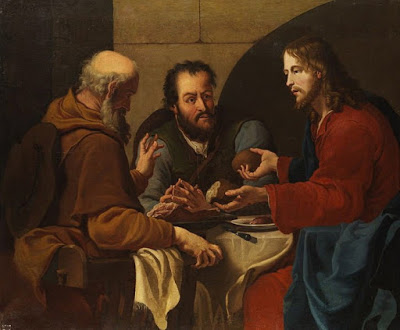 We will recognise Him in the Breaking of Bread
We will recognise Him in the Breaking of Bread
St Luke, in the last chapter of his gospel, beautifully paints this life-changing encounter with the Risen Lord. Without missing a beat, he incisively describes how the disciples had completely lost their bearings and sense of spiritual direction in the overwhelming aftermath of Jesus’ death: “They stopped short, their faces downcast”. So caught up in their own pain, they were unable to recognise the One who stood before them, the One who bore our pain and suffering on the cross so that we may not have to bear them for eternity.
The Road to Emmaus, which originally started as a walk of shame and a retreat after a massive defeat, was transformed into a march of restoration and growth. On that road, there was a re-learning on the part of the disciples. They had most likely heard these scriptures many times before. The stories were familiar but now they needed to be told once again. This was necessary in order for them to really grasp the significance of the Cross. Who better to teach them these things than the very One who sent the prophets and gave them words?
But this dialogue would not be the high point of the story. All this merely leads to the climax which takes place at the end of the story - the breaking of bread. The Word of God leads to the Sacrament of God. We say that the Scriptures are light for our path, and that path leads to the Eucharist.
Some commentators have suggested that the disciples finally recognised Jesus simply because of a familiar gesture on His part. But this understates how Luke purposefully uses words which he had used in his account of the Last Supper (Lk 22:19-20). Yes, the disciples certainly recognised that gesture, but the recognition was a gift of grace - it was the very celebration of the Eucharist that helped them recognise the Lord.
The Church recognises that Christ is present in the congregation, the priest and the Word of God. But there is something unique about His presence in the Eucharist. The Catechism of the Catholic Church (1374) teaches that this Eucharistic presence “is called 'real' - by which is not intended to exclude the other types of presence as if they could not be 'real' too, but because, it is presence in the fullest sense: that is to say, it is a substantial presence by which Christ, God and man, makes himself wholly and entirely present."
Although Jesus has now returned to the Father, and no longer appears in risen glory amongst us, in the Eucharist He comes to us less dramatically, but just as “real”, as He did to the first disciples after the resurrection. Each time we celebrate the Eucharist we meet the risen Lord, not just symbolically or as a memorial, but in person, in the flesh, although He hides under the guise of bread and wine.
Each time our Lord celebrates the Eucharist for us, He invites us to recognise Him. He does not compel us to do so, through spectacular miracles. Instead, He gently invites us. It is because He comes so quietly, so respectful of our freedom to respond in faith, that we can miss Him in the Eucharist. Too often we yearn for the spectacular religious experience, and miss the lifegiving encounter so repeatedly offered in the Mass. And yet in this quiet, repetitive celebration, we find life, abundant life.
The effect of recognising Him "in the breaking of the Bread" is action. The disciples did not linger at Emmaus. They hurried back to Jerusalem to proclaim that they had seen the Lord. Likewise, the Christian is not expected to linger at the Eucharist. It is an encounter with Jesus, in Word and Sacrament, which sends the Christian out to witness. We come to Mass so that we may go back into the life of discipleship, renewed by the encounter with our risen Saviour, and made ready for action in His service.
Just like the two disciples who dragged their feet in shame and grief back to Emmaus, our faith can sometimes become stale just like our experience of the Eucharist. Routine can deaden our spiritual senses. The flame of faith that had been instilled in us can become dimmed to the point of being extinguished. During this long separation from the Eucharist, many, including the most fervent, may fall prey to this dilemma. Our road to return to normalcy, to return to our churches, to return to the Eucharist, may be far longer than the return road to Emmaus and so many would be tempted to give up along the way.
But this is not the time to despair, our Lord continues to come to meet us on our personal road to Emmaus. This is because our faith needs constant refreshing by the experience of an encounter with the risen Lord. That opportunity is open to us every time we celebrate the Eucharist. You may not be able to do so now but we have other opportunities where you can encounter the Risen Lord. You can encounter Him in the encouragement given by a friend or a family member. You can encounter Him in your daily meditation of scriptures. You can encounter Him in a life of personal prayer. And within all these encounters, there is always an opportunity for our hearts to burn once again with new fervour and excitement, and opportunity to look back at all the pitfalls, difficulties and losses we’ve experienced, and recognise that He was not far away. And finally, an opportunity to recognise Him again in the breaking of bread when we gather once again in our churches to celebrate the Sacrament of His sacrificial love on the cross.

